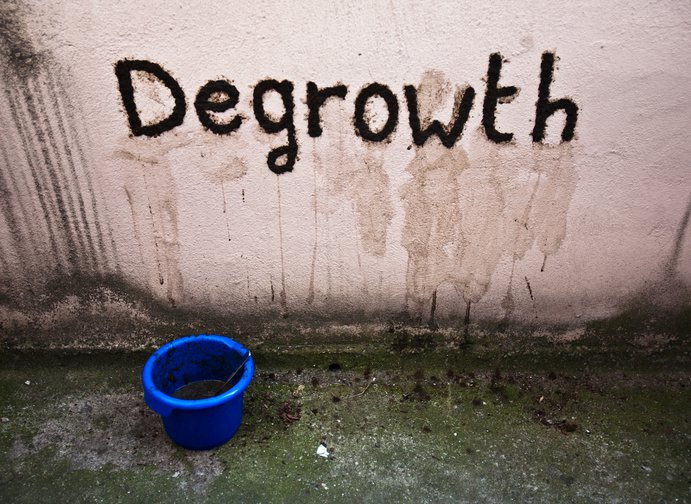A reduction of economic activity is necessary and just – and can lead to human flourishing.
 Moss Graffiti Image: Kulturlabor Trial&Error, CC BY-NC-SA 2.0
Moss Graffiti Image: Kulturlabor Trial&Error, CC BY-NC-SA 2.0
To sustain the natural basis of our life, we must slow down. We have to reduce the amount of extraction, pollution, and waste throughout our economy. This implies less production, less consumption, and probably also less work.
The responsibility to do so must lie mainly on the rich, who currently enjoy a disproportionate share of our resources. But we should also do things differently, as much of today’s economic activity is of little benefit to human wellbeing. Imagine what could be if we organized democratically to produce what we actually need, distributed those resources fairly, and shared them in common. This, in a nutshell, is the vision of degrowth: a good life for all within planetary boundaries. And while this might seem utopian, there are already concrete policy ideas to start such a transformation.
In a recent article, Leigh Phillips argues that this is a delusion. He brings forth three main critiques: degrowth is (1) not necessary, (2) unjust, and (3) marks the end of progress. He suggests that we should “take over the machine, not turn it off”, expressing his concern that an end to growth would mean an end to all the things that makes our lives so rich, like for example fridges. This reminds him of the likes of Malthus or Thatcher, whose ideologies have supported the imposition of unjust limits onto the poorer parts of society….
Degrowth is necessary
Phillips acknowledges that we need to stay within planetary boundaries. But as an ecomodernist, he believes that all environmental problems can be solved by a shift in technology. All we need to do is become more efficient. This version of post-environmentalism has received a lot of support, as it aligns well with existing powerful interests in the economy. But it is problematic for many reasons.
First, there is no evidence for this claim. The potential of our current technology is limited. And the potential of future innovation is uncertain. As Phillips acknowledges himself, it will take considerable time until new technology arrives. We should not gamble away our future on ideas with such a low (if even known at all) probability of success.
Let us illustrate this in relation to climate change. The latest IPCC report to limit global warming to 1.5° presents four scenarios. Three of them strongly depend on negative emission technologies, which are highly controversial as they have not been proven to work at the required scale and represent an “unjust and high-stakes gamble”. The IPCC also provides a fourth scenario that does not rely on negative emissions, but which notably requires that “global material production and consumption declines significantly”.
Some demand reduction could be achieved through efficiency improvements. But these might be less effective than they appear. As long as we keep pursuing growth, such improvements will be used for further expansion. This can counteract possible environmental gains. Simply put, efficiency improvements make things cheaper and therefore push up consumption. Such a rebound effect has been found both in different countries and industries.
What is more, technological shifts always come at an environmental cost. Every sector of our economy is still based on some form of extraction, pollution, and waste. And all of them depend on carbon. Renewable energy, in particular, requires a great amount of rare minerals and land-use. The same goes for nuclear energy, which demands considerable resources in order to mine uranium, construct power plants, and deal with its waste. Even digital technology has environmental impacts.
Phillips tries to argue against this by pointing at past solutions to environmental problems, like the ozone layer or deforestation. However, he does acknowledge that those examples do not compare well to a bigger challenge like climate change. Some of those challenges were solvable because they only affected a single sector and an easy technological replacement was available.
Additionally, many past environmental challenges have not been overcome, but have simply been reshaped and displaced. Philips points towards the fact that net deforestation ceases in rich countries. But this is mainly because agricultural production is outsourced to poorer ones. The study he uses to show the increase in global tree-cover also shows an alarming reduction in tropical areas. The recent Amazon fires in Brazil, for example, are connected to increased deforestation efforts for agricultural expansion in the territory of the world’s 22nd largest export economy. The total amount of environmental degradation caused by our economy remains coupled to economic activity.
Finally, it is important to understand that environmental issues are all interrelated. Even the successful ozone depletion is nowadays under threat as climate change could reverse the recovery of the ozone layer. The deforestation study mentioned above shows that climate change has contributed to both increases and decreases of vegetation in different parts of the world. Mass extinction is another serious threat that our planet is experiencing at the moment, which is also connected to deforestation. And we know that most mass extinctions of the past “had something to do with rapid climate changes”.
All this means that it is hard to see a way around a reduction of economic activity. MORE


